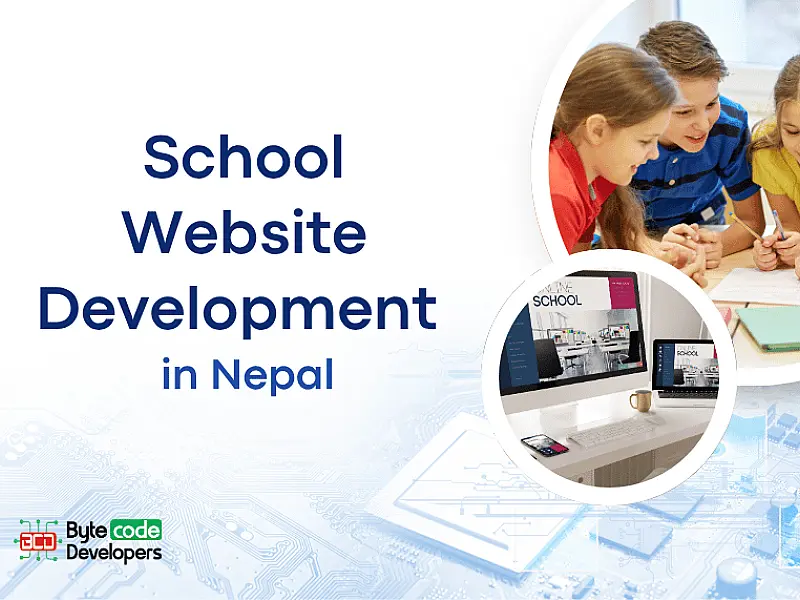
Table of Contents
In a rapidly digitizing world, Nepal’s education system is standing at a pivotal crossroads, where tradition meets technology. In this transformation, a school’s website is no longer a luxury or a branding accessory. It has evolved into a vital digital hub, central to academic operations, parent engagement, and institutional trust.
Why Every School in Nepal Needs a Website
Imagine a parent is searching for a quality school for their child. What’s the first thing they check? A Google search. A well-structured, informative, and mobile-responsive website is often the first impression, and in many cases, the deciding factor for enrollment.
School websites today serve multiple crucial purposes:
- Instant publication of examination results, academic timetables, and important notices
Online admission forms and inquiry systems that reduce manual paperwork
Showcasing student and faculty achievements, sports, and cultural activities
Announcements of holidays, Parent-Teacher Meetings (PTMs), and school events
Visibility and trust-building through digital presence
Dedicated portals for students, teachers, and parents to access resources and communicate
In the post-COVID era, parents expect schools to be digitally competent. Having a well-maintained, mobile-friendly website is no longer optional; it’s essential.
Key Features of an Effective School Website
An effective school website should be more than aesthetically pleasing. It must be functional, intuitive, and aligned with the school’s goals. Here are the key components:
| Feature | Purpose |
|---|---|
Home Page | Highlights the school vision, achievements, and key announcements |
About Page | Tells your story: school history, leadership, and principal's message |
Admission Page | Clear application forms, admission criteria, and fee structure |
Academic Calendar | Details on exams, term dates, and school holidays |
Notice Board | Dynamic updates in real time |
Gallery | Photos and videos from school life, sports, and cultural events |
Faculty Page | Teachers’ bios and qualifications to inspire confidence |
Downloads | Syllabi, prospectus, and assignment materials |
Contact Page | Interactive map, contact form, phone, and email details |
Login Portals | Secure access for admins, teachers, students, and parents |
Additional tools, such as chatbots, feedback forms, and integration with learning apps, further enhance engagement and streamline communication.
CMS vs. Custom-Built Websites: What Should Schools Choose?
When building a school website, institutions often choose between Content Management Systems (CMS) like WordPress or custom-built solutions using frameworks like Laravel or React.
Plateform | Pros | Cons |
|---|---|---|
WordPress CMS | Affordable, fast to deploy, easy for non-technical staff to manage | May lack scalability for advanced features |
Custom Build (Laravel/React) | Highly customizable, scalable, and secure | Requires more time, budget, and ongoing developer support |
For most schools, especially primary and secondary institutions, a content management system (CMS) like WordPress, paired with an education-focused theme, is a cost-effective and sustainable starting point.
Recommended Technology Stack for School Websites
Choosing the right tools determines the long-term effectiveness of your digital presence:
Stack | Description |
|---|---|
WordPress + Elementor | Use-friendly drag-and-drop builder for easy editing |
Laravel + Vue.js | For advanced features like dashboards and real-time chat |
Firebase Backend | Enables mobile-friendly, real-time notifications |
Bootstrap 5 | Responsive design for all screen sizes |
MySQL/PostgreSQL | Robust data management for school operations |
The tech stack should align with your long-term vision, whether it’s basic information display or complete digital integration.
Designing for the Nepali Context: UX Tips for Better Reach
Digital inclusivity is crucial, particularly in regions with limited internet access or rural populations. Here are tips to ensure a great user experience:
Stick to school branding (colors, logos, fonts) for authenticity
Maintain consistent navigation and logical structure
Use small, readable content blocks for easier access
Ensure fast loading on 3G/4G networks
Make the design fully responsive for mobile users
Provide bilingual options (Nepali and English) to cater to diverse communities
Registering a .edu.np Domain: A Step Toward Digital Legitimacy
A government-recognized .edu.np domain adds legitimacy and improves discoverability.
Steps to register:
- Apply through register.com.np
- Provide school registration documents and official letterhead
- Domain registration is free for verified academic institutions
Hosting Recommendations:
Choose reliable hosting such as eHostingServer (Nepal) or Hostinger (global)
Use cPanel for easy backend management
Install SSL certificates (e.g., Let’s Encrypt) for secure browsing
Boosting Online Visibility: SEO for School Websites
To rank well on search engines for terms like “best school in Kathmandu” or “school admission 2082, schools must invest in Search Engine Optimization (SEO):
Use keyword-rich meta tags and titles
Create unique landing pages for each grade/program
Maintain an updated Google Business Profile
Publish blog posts on parenting tips, academic updates, and FAQs
Ensure alt-text for images and clean, structured content
Strong SEO ensures your school gets noticed in an increasingly competitive digital space.
Mobile-First Design & Speed Optimization: A Must in Nepal
With over 90% of Nepali users accessing school websites via smartphones, your site must load fast and adapt seamlessly to mobile devices.
Optimization tips:
Use WebP images for smaller file sizes
Implement lazy loading for image galleries
Set up CDN (Content Delivery Networks) for faster access
Use caching plugins (like WP Rocket for WordPress)
Minify CSS and JavaScript to speed up load times
Conclusion: Your School's Website is More Than a Page: It's a Portal to the Future
In the journey toward educational equity and modernization in Nepal, a school website is more than just a digital brochure; it is a dynamic platform that connects educators, students, and parents. From rural municipalities to urban private academies, schools must embrace digital transformation as part of their core identity.
Investing in a quality school website means:
Strengthening parent-school communication
Simplifying admissions and academic management
Building a credible online presence
Supporting e-learning and student engagement
The digital age of education has already arrived. Don’t let your institution be left behind. Start building your school’s digital future today.




 March 26, 2025
March 26, 2025











